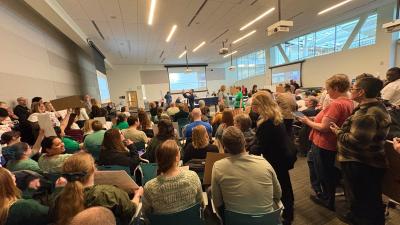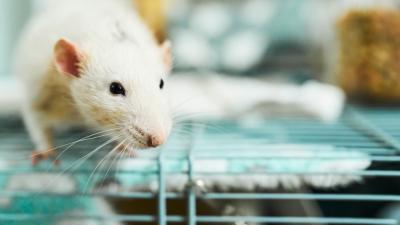Physicians Group to SEC: Elon Musk’s DealBook Summit Claims About Dead Monkeys May Be Securities Fraud
Public Records Show 12 Monkeys Died as a Direct Result of Neuralink Implants, but Musk Said Animals Had “Terminal Case of Cancer or Something Like That”

WASHINGTON, D.C.—In a letter sent today, a national physicians group is asking the U.S. Securities and Exchange Commission to investigate Elon Musk for securities fraud after he recently doubled down on false claims about what caused monkeys’ deaths at his brain-computer interface company Neuralink. On Nov. 29, during the DealBook Summit hosted by The New York Times, Musk said monkeys “were about to die” when Neuralink employees cut open their skulls and implanted devices. When seemingly referring to an individual animal, he stated, “it had a terminal case of cancer or something like that.” But the Physicians Committee for Responsible Medicine, which sued to successfully obtain almost 600 pages of veterinary records, points out that none of the 12 monkeys who died following the surgeries appear to have had terminal diseases. Because Musk’s statements pertain to health risks resulting from the invasiveness of the implant, the group claims Musk is misleading investors about the safety and marketability of the company’s product. The Physicians Committee originally asked the SEC to investigate Musk in September after he misleadingly posted on X that, “No monkey has died as a result of a Neuralink implant.” In November, four U.S. lawmakers also asked the agency to investigate the matter.
If the SEC takes action, it would not be the first time it has penalized Musk for misleading investors. In 2018, it charged Musk for a series of false and misleading tweets about a potential transaction to take the company Tesla private. At the time, then co-director of the agency’s Enforcement Division stated, “Taking care to provide truthful and accurate information is among a CEO’s most critical obligations.”
Neuralink itself issued a statement in February 2022 that contradicts Musk’s recent claims, stating that six monkeys were euthanized due to declining health following surgeries at the University of California, Davis, where the company conducted experiments between 2017 and 2020. Four of the deaths were because of “suspected device-associated infections,” one was due to a “device failure,” and another was because the surgical adhesive BioGlue seeped onto a monkey’s brain, causing debilitating health problems.
The BioGlue incident involved a seven-year-old rhesus macaque known only as “Animal 21.” Neuralink surgeon Matthew MacDougall, MD, used the adhesive to fill holes he had drilled in her skull. Her veterinary records show she soon began suffering from swelling in her brain, causing partial paralysis in both legs and “depression.” She was seen “gasping/retching,” and she “collapse[d] from exhaustion/fatigue.” When she was finally euthanized, the necropsy report revealed that BioGlue was “covering and compressing a large area of the left cerebrum” and blood had built up on the surface of her brain. The report also found “acute” ulcers in her esophagus “likely due to vomiting” and blood in her stomach. The necropsy report made it clear that Dr. MacDougall’s use of BioGlue was to blame: “Bioglue was toxic to the adjacent tissues (as described in the contraindications and warning sections of the [Instructions for Use]).” There is no evidence that Animal 21 was suffering from a terminal disease when she was subjected to the experiment by Neuralink.
None of the monkeys’ health records indicate they were “close to death,” as Musk also stated in September. Rhesus macaques often live to about 25 years in captivity, with some living to 40. But the average age of the 12 monkeys killed by Neuralink was 7.25 years.
The Physicians Committee points to concerns raised by medical experts about the health risks of highly invasive devices like Neuralink’s and their significant potential for severe medical complications in patients. The group has urged Neuralink to halt its animal experiments, which it continues to conduct at facilities in California and Texas, and to instead focus on improving noninvasive brain-computer interfaces.
“Neuralink’s device killed monkeys, raising serious questions about whether it is unsafe and dangerous to patients,” says Ryan Merkley, director of research advocacy with the Physicians Committee. “Now Musk is again deliberately misleading investors and the public by lying about the company’s experiments.”
While the U.S. Food and Drug Administration reportedly approved Neuralink in May 2023 to begin very limited human clinical trials, a significant number of medical devices that begin clinical trials never reach the market.
To speak with Mr. Merkley or to see a copy of the SEC complaint or the original documents from UC Davis, please contact Reina Pohl at 202-527-7326 or rpohl [at] pcrm.org (rpohl[at]pcrm[dot]org).
Media Contact
Reina Pohl, MPH
202-527-7326
rpohl[at]pcrm.org
Founded in 1985, the Physicians Committee for Responsible Medicine is a nonprofit organization that promotes preventive medicine, conducts clinical research, and encourages higher standards for ethics and effectiveness in education and research.








